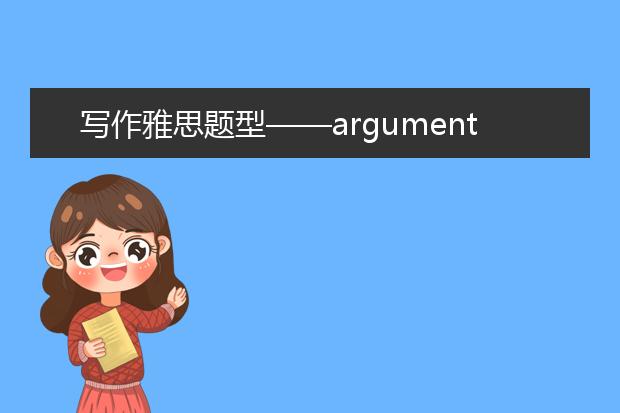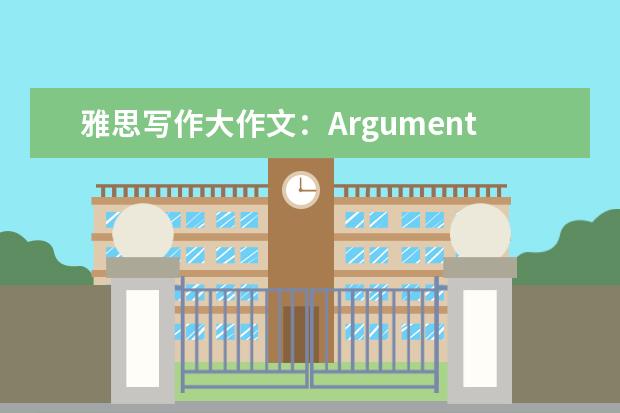雅思考试主要是通过对考生听、说、读、写四个方面英语能力的考核,综合测评考生的英语沟通运用能力,实现“沟通为本”的考试理念。对于雅思考生来说,也有很多考试难点和政策盲区需要帮助解答。今天雅思无忧网小编准备了文章雅思写作论文Constructing a Logical Argument,希望通过文章来解决雅思考生这方面的疑难问题,敬请关注。

本篇中的杜婷老师将为大讲解如何去辨别一篇雅思写作题中的观点。
有时候议论可能不是按照顺序来写的。比如结论被放在开头进行陈述,而支持论点的论证反而是紧随其后的。观点可能比结论和论证更难理解。许多人可能会把脱离了实物的理论描述当成观点,但这些陈述只是看上去像观点,其实并不是。
下面来看一个例子:
"If the Bible is accurate, Jesus must either have been insane, an evil liar, or the Son of God."
The above is not an argument, it is a conditional statement. It does not assert the premises which are necessary to support what appears to be its conclusion. (Even if we add the assertions, it still suffers from a number of other logical flaws -- see the section on this argument in "Alt.Athei* Frequently Asked Questions".)
再来看一个例子
"God created you; therefore do your duty to God."
The phrase "do your duty to God" is neither true nor false. Therefore it is not a proposition, and the sentence is not an argument.
Causality is important. Suppose we are trying to argue that there is something wrong with the engine of a car. Consider two statements of the form "A because B". The first statement:
"My car will not start because there is something wrong with the engine."
The statement is not an argument for there being something wrong with the engine; it is an explanation of why the car will not start. We are explaining A, using B as the explanation. We cannot argue from A to B using a statement of the form "A because B".
However, we can argue from B to A using such a statement. Consider:
"There must be something wrong with the engine of my car, because it will not start."
Here we are arguing for A, offering B as evidence. The statement "A because B" is then an argument.
To make the difference clear, note that "A because B" is equivalent to "B therefore A". The two statements then become:
"There is something wrong with the engine, therefore my car will not start."
And:
"My car will not start, therefore there is something wrong with the engine."
If we remember that we are supposed to be arguing that there is something wrong with the engine, it is clear that only the second statement is a valid argument.
Implication in detail
There is one very important thing to remember: The fact that a deductive argument is valid does not imply that its conclusion holds. This is because of the slightly counter-intuitive nature of implication, which we must now consider more carefully.
Obviously a valid argument can consist of true propositions. However, an argument may be entirely valid even if it contains only false propositions.
For example:
All insects have wings (premise)
Woodlice are insects (premise)
Therefore woodlice have wings (conclusion)
Here, the conclusion is not true because the argument's premises are false. If the argument's premises were true, however, the conclusion would be true. The argument is thus entirely valid.
More subtly, we can reach a true conclusion from one or more false premises, as in:
All fish live in the sea (premise)
Dolphins are fish (premise)
Therefore dolphins live in the sea (conclusion)
However, the one thing we cannot do is reach a false conclusion through valid inference from true premises.
We can therefore draw up a "truth table" for implication. The symbol "=>" denotes implication; "A" is the premise, "B" the conclusion. "T" and "F" represent true and false respectively.
Premise Conclusion Inference
A B A=>B
----------------------------
F F T
F T T
-- If the premises are false and the inference valid, the conclusion can be true or false.
T F F
-- If the premises are true and the conclusion false, the inference must be invalid.
T T T
-- If the premises are true and the inference valid, the conclusion must be true.
A sound argument is a valid argument whose premises are true. A sound argument therefore arrives at a true conclusion. Be careful not to confuse sound arguments with valid arguments.
Of course, we can criticize more than the mere soundness of an argument. In everyday life, arguments are almost always presented with some specific purpose in mind. As well as criticizing the argument itself, one can criticize the apparent intent of the argument. Such critici* is outside the scope of this document, however!
以上就是雅思无忧网为您准备的雅思写作论文Constructing a Logical Argument访问雅思无忧网(https://www.yasi.cn/),了解更多雅思考试新消息,新动态。


 Emphasis: brilliant and logical debate in IELTS Task 2
Emphasis: brilliant and logical debate in IELTS Task 2
 写作雅思题型——argument和report
写作雅思题型——argument和report
 【GRE写作】Argument 精选真题范文(十)
【GRE写作】Argument 精选真题范文(十)
 【GRE写作】Argument 精选真题范文(八)
【GRE写作】Argument 精选真题范文(八)
 雅思写作大作文:Argument类型
雅思写作大作文:Argument类型
 雅思写作技巧
雅思写作技巧
 如何避免雅思写作词汇和语句的重复
如何避免雅思写作词汇和语句的重复
 雅思写作要不要背范文?当你在背范文的时候你在背什么?
雅思写作要不要背范文?当你在背范文的时候你在背什么?
 雅思写作考试2019最新评分标准细则讲解
雅思写作考试2019最新评分标准细则讲解
 【雅思写作年中总结】2019年上半年雅思大作文考情综述
【雅思写作年中总结】2019年上半年雅思大作文考情综述